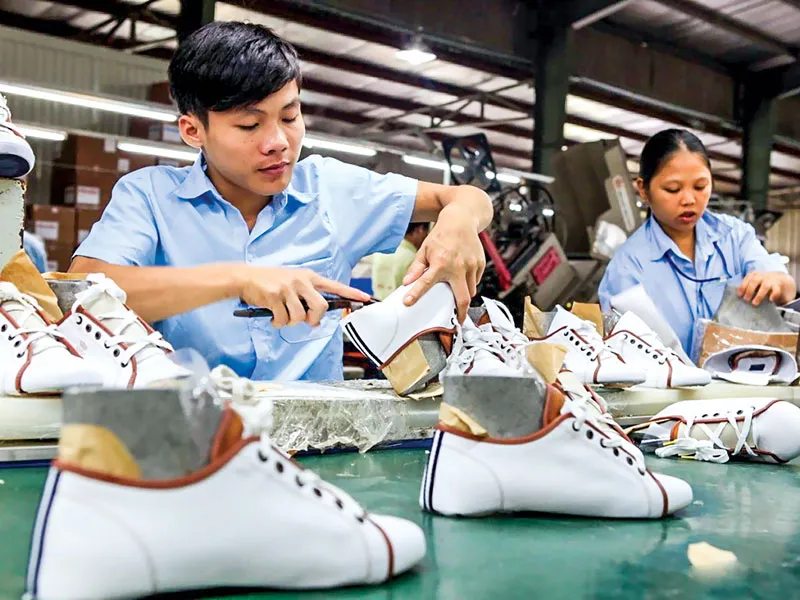
er the last few months, with no signs of it being eradicated anytime in the near future, could cause millions of Chinese businesses to go bankrupt in coming months.
This will no doubt have a serious effect on the global supply chain, which includes many Vietnamese enterprises. On the other hand, this must be seen as an opportune time for businesses in Vietnam to restructure, innovate, accelerate reforms, improve performance and quality, and gradually reduce dependence on China.
Current implications
According to economic analysts at US based investment services of Morgan Stanley, production activities of Chinese enterprises since the outbreak of Covid-19 have dropped to just around 30%. Morgan Stanley assessed that Chinese enterprises will only be able to return to normal production by the end of March, and only if the spread of the disease is well under control. This expectation is looking more and more doubtful as new and unusual developments in the Covid-19 epidemic are being seen across the globe.
In these circumstances, millions of businesses across China are expected to go bankrupt within the next one to three months, with even the Chinese banking system expected to face a crisis battering. Ed Hyman, an economist and chairman of Evercore ISI, predicts that China’s economy of more than one billion people will grow a flat 0% in the first quarter of 2020.
In the current scenario, manufacturing in China has become paralyzed ever since the Chinese government locked down entire cities to prevent the spread of Covid-19. Since China has long been the world’s manufacturing hub, stagnant production has disrupted the entire global supply chain and risk of bankruptcy of millions of Chinese enterprises looms large. The direct impact of this disruption is being felt worldwide with negative consequences.
Vietnam too has been heavily impacted. For many years, Vietnam's manufacturing and products industries have depended solely on the supply of raw materials and components imported mainly from China. Now, many businesses say their stocks of spare parts may last only until the middle or end of March. Textile, footwear and handbag units say that they have raw material stock that will finish by the beginning of April. All these units will likely have to suspend production or possibly completely shut down.
Those enterprises that are manufacturing and assembling cars are also in distress as they rely on 70% components imported from China. Other businesses from steel to furniture are also in trouble and more than 50% of construction businesses are having difficulty in sourcing.
According to data published by the General Department of Customs in February, total value of the country’s imports and exports in January were only at USD 36.62 bn, down 18.4% compared to the previous month and down 16.2% compared to the same period in 2019. With this fall, the country's trade balance of goods in January saw a deficit of USD 232 mn, which in the same period last year saw a surplus.
Opportunity for reform
Many people are concerned that this disruption and break in production in so many Chinese enterprises could lead to a "domino effect" and cause Vietnamese enterprises to shut down as well. This concern is not unwarranted, when looking at the degree of dependence of Vietnamese enterprises on import and export from the Chinese market.
According to statistics from the General Department of Customs, Vietnam's export turnover to China in 2019 reached USD 75,452 bn, accounting for nearly 30% of Vietnam's total export turnover, while imports reached USD 41,414 bn. However, many economic experts believe that this is an opportunity for Vietnamese enterprises to retrospect and innovate and join other production chains, which will then reduce dependence on the Chinese market.
Currently, there are many large markets and several other opportunities for businesses. For example, when the CPTPP Agreement comes into effect, Vietnamese enterprises will have a potential market and Vietnamese businesses will be given tax incentives, have access to more export markets and be able to import raw materials for production from elsewhere. However, for this, businesses will have to innovate and willingly change their way of working.
Asso. Prof. Dr. Dinh Trong Thinh also feels that in the long term, Vietnam needs to have a strategy to develop support industries, focus on some important basic material industries such as steel, fabric and materials, and thereby reduce dependence on imported raw materials and components from China. In addition, it is necessary to focus more on supporting capacity of enterprises through credit solutions, improve quality of human resources, innovate, create and develop markets as well as provide many tax and land incentives.
From a macro-economic perspective, PhD. Le Dang Doanh, former head of the Central Institute for Economic Management (CIEM), said that the crisis caused by the Covid-19 epidemic was also a "high dose vaccine", a test to check the "health" of Vietnamese businesses. He believes this is also an opportunity for Vietnam to accelerate its reforms, reduce dependence on China, and step by step rebalance the structure of the economy.
To do this would require greater effort and even accept initial economic disadvantages, as in this situation, Vietnam's economy will have to restructure, renew production, find new markets, components and new cooperation channels as well. This should be seen as an opportunity and Vietnam should take full advantage of this.




















